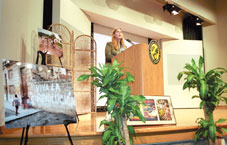Cuban researcher analyzes cultural films

On Oct. 15 in Webster Hall Auditorium, Dr. Tamara Falicov lectures on the Cuban film industry, specifically focusing on changes in the island´s cinematography since Castro´s revolution.
Move over Hollywood, here comes Havana.
Dr. Tamara L. Falicov, assistant professor of film studies and Latin American studies at the University of Kansas, spoke to a crowd of students and faculty Oct. 15 filling two-thirds of Webster Hall Auditorium.
She lectured and gave examples of the film industry in Cuba, past and present. She specifically addressed some of the Cuban stereotypes and the differences between films from the Batista and Castro regimes.
“There isn’t really censorship, like you might think there is,” Falicov said.
“I remember Alice in Wonderland playing for about a week and then it was pulled. But other than that, it’s really more about whether they make it or not.”
She began her lecture with a short history of Cuban films. She said the film revolution began when the major Cuban film studio burned down.
“A group of students went to Italy to study film making,” she said.
While there, the students found a new style of film that involved showing the realities and hardships of everyday life.
The students returned to Cuba and produced a revealing film of the hardships of the Batista regime.
“It kind of aired their dirty laundry,” Falicov said. “That was the first and last film like that during the Batista regime.”
Falicov showed slides of pre and post-revolutionary movie posters. She said they are unique because of their bold use of color and shapes.
She showed a 10-minute segment of a Cuban movie called The First Time. The film dealt with American filmmakers who took a van into the Cuban countryside and gave the residents their first movie experience.
Many of the Cubans didn’t even know what a movie was.
“I think it must be something important because you all are so interested in it,” said one of the Cubans.
Another Cuban resident imagined a movie being something like a “party” or “dance.”
This lack of film availability surprised some students.
“I had never been exposed to Cuban films before and I was surprised that a lot of people had never seen a movie before,” said Terra Higgins, junior psychology major.
“I guess I thought everybody had seen one before.”
Falicov said the Cuban people also enjoy American movies.
“There are people who fashion satellites out of tin foil,” she said.
Falicov received a Fulbright scholarship to study in Buenos Aires, Argentina, in 1997-1998. Her work has appeared in journals and has received numerous awards and her book, Representing the Rural in the Cinema, will be released 2004.
Your donation will support the student journalists of Missouri Southern State University. Your contribution will allow us to purchase equipment and cover our annual website hosting costs.















